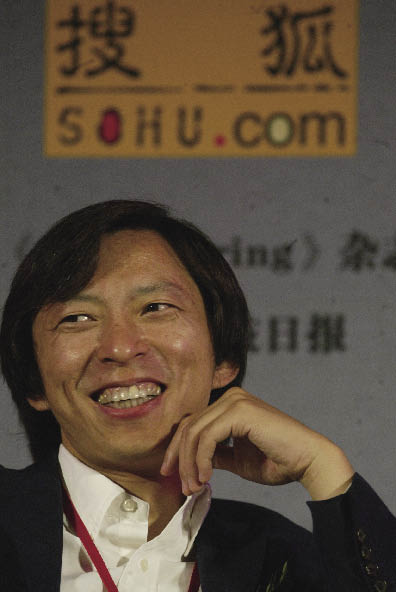|
Stars of Different Shades
Zhang Chaoyang (Charles Zhang) was the first tycoon of China's Internet economy boom. Born into a working-class family, he managed to get into the Physics Department of Tsinghua University, China's most esteemed institute of higher education. Upon graduation he was granted a scholarship from the Nobel laureate physicist Tsung-Dao Lee, which financed his study at the Massachusetts Institute of Technology. After earning a doctorate at MIT, Zhang returned to China to start an IT company, and founded Sohu in 1997, now one of the leading commercial websites in China.
|

|
| Zhang Chaoyang, CEO of SOHU. |
Zhang is one of the brightest stars in the nation's intellectual economy. Most people in this group have humble roots but an elite education, and have enjoyed rags-to-riches stories. Unlike magnates in other sectors, they are not shy of the media and enjoy the limelight. Charles Zhang, for instance, is the best public relations envoy of his own company. He is active in music, sports and fashion, and made big news by climbing the Himalayas, posing for the front cover of Esquire magazine, and taking the role of chief journalist for the official website of the Beijing Olympics. Zhang's achievements provide a powerful inspiration for young people.
Though wealth and social status are major yardsticks for success in every society, moral strength is no lesser a measure. It is just this that makes Hong Zhanhui, a poor student, a hero for common people. When Hong was 11, his family was hit by two mishaps: his younger sister died and his father was diagnosed with schizophrenia. His father later brought home an abandoned baby girl. After suffering under her husband's mental illness, Hong's desperate mother deserted her brood. When Hong Zhanhui's younger brother came of age, he also left. For 12 years Hong was the only provider for his sick father and adopted sister, taking all kinds of odd jobs while attending middle school and later college.
When choosing him as one of the "Ten Persons Who Moved China in 2005," the selection panel wrote: "When he was a child himself, he had to shoulder the duty of caring for a younger child, and bind a family facing extreme adversity. But he learnt the virtues of kindness, courage and adamancy in the test of life…" On explaining his motivations, Hong said: "I believe everyone has responsibilities, for oneself, for ones' family and towards society as well. I just kept pushing ahead, and wouldn't give up." Asked about the veneration his peers poured on him, Hong replied: "If I am regarded as an idol, we should feel sad because that means no other person has done what I have."
Moral fortitude does not, however, often play much of a role in the forging of stars nowadays. The far-reaching penetration of the Internet and the mass media makes it possible for almost anyone with extraordinary qualities to carve out a moment of fame. In 2003 a local TV channel launched a Chinese edition of American Idol, named Super Female Singer, and the audiences' response was overwhelming. A legion of similar shows appeared in its wake, repeating rags-to-riches stories every week.
Compared with the icons of previous decades, today's stars of popular culture are primarily loved for appearing like idealized versions of the fans themselves, and showing the natural imperfections of human beings. For most of them, glory is a meteoric rise and fall, as popular taste shifts fast, and newcomers are churned out all the time. With increasing awareness of, and concern for, their sense of self, Chinese people no longer submit to juggernauts the way they did in previous ages. |
